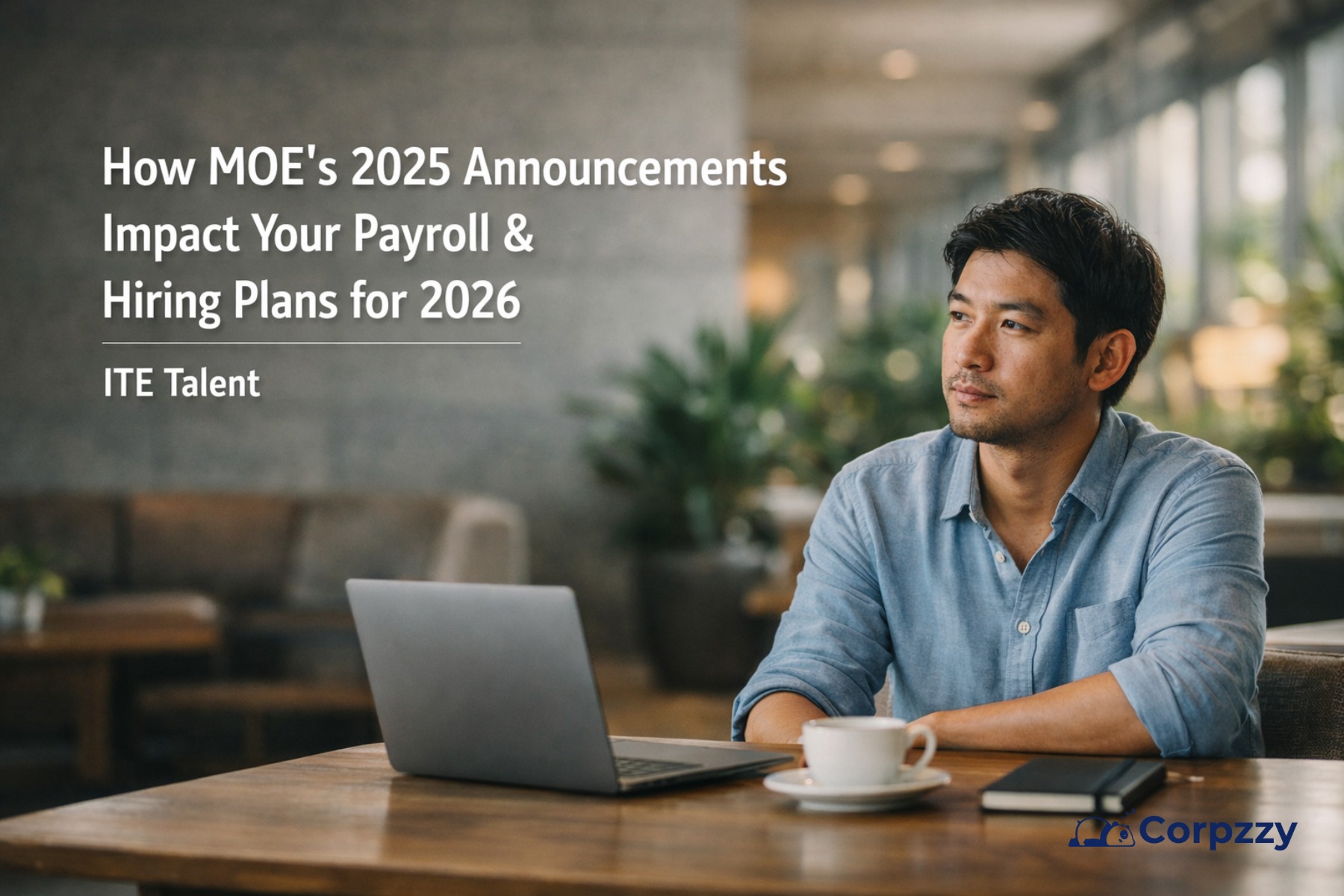Automating Your Accounting Department with AI? Make Sure Your Entity Is Set Up for Compliance First
Automating Your Accounting Department with AI? Make Sure Your Entity Is Set Up for Compliance First
Outline

In Singapore, automation is transforming the way businesses manage their accounting operations. From AI-powered bookkeeping to predictive analytics, technology is streamlining processes that were once time-consuming and error-prone. However, integrating artificial intelligence (AI) into your accounting department comes with significant compliance responsibilities. Failing to address these early can result in costly penalties, reputational damage, and stalled business growth.
This article serves as a comprehensive guide for Singapore-based business owners and startups looking to automate their accounting operations while maintaining full regulatory compliance. Whether you’re an SME owner or launching a new venture, ensuring your company is correctly structured and compliant is essential before deploying AI tools in your accounting workflows. We’ll explore the key regulations from ACRA and IRAS, the corporate setup best practices, and how a professional company secretary can safeguard your operations.
Key Takeaways
- AI in Accounting Boosts Efficiency: Automating accounting processes using AI tools like invoicing, reconciliation, and forecasting can reduce human error and increase real-time visibility—but only if integrated correctly.
- Compliance Must Come First: Businesses must ensure their entity structure aligns with ACRA and IRAS requirements before implementing AI. Non-compliance can lead to legal penalties and inaccurate filings.
- Company Secretary is Critical: A qualified company secretary bridges the gap between automation and regulatory filing, ensuring all statutory obligations are met even with AI-driven systems.
- Structuring Matters: The right business structure, including proper shareholding records and governance protocols, is essential for AI systems to function in a legally compliant environment.
- AI Complements, Not Replaces Governance: While AI tools automate repetitive tasks, directors and secretaries remain responsible for oversight, governance, and final reporting approvals.
- Hiring Talent Requires Compliance: Companies looking to hire foreign talent for AI-based accounting roles must be properly incorporated and meet MOM’s Employment Pass standards.
- Integrated Strategy Wins: Successful AI accounting setups combine robust digital tools with expert company incorporation, corporate secretarial services, and ongoing compliance support.
- Why Businesses Are Automating Accounting with AI
AI is revolutionizing accounting departments by reducing manual data entry and accelerating reporting accuracy. Tools like automated invoicing, machine-learning reconciliation, and real-time cash flow forecasting are now accessible even to small businesses. These technologies help business owners make faster decisions based on up-to-date financial data. Automation also reduces the likelihood of human error, improving overall accuracy and efficiency.
SMEs in Singapore are increasingly using AI-powered accounting software like Xero, QuickBooks, and AutoCount integrated with local GST reporting features. With cloud-based automation, teams can manage accounts remotely and in real time. This aligns well with Singapore’s Smart Nation vision and digital transformation push. However, without proper structural and compliance measures, the benefits can quickly backfire.
Common Risks of Automating Without Compliance
Automating your accounting functions without a compliant company structure can lead to several risks. The most common issues include late or inaccurate tax filings, unstructured data retention, and breaches of financial reporting standards. These can trigger audits, fines, or legal complications with ACRA and IRAS. Businesses must ensure their entity is set up to handle automation responsibly.
Another common mistake is failing to establish proper internal controls when shifting to AI-based systems. Without oversight, automated processes can produce inaccurate data that misrepresent your financial health. Moreover, directors can be held liable for non-compliance if statutory reporting duties are neglected. This is where the role of a corporate secretary becomes indispensable.
The Role of ACRA and IRAS in Financial Compliance
In Singapore, two major authorities govern financial and corporate compliance: ACRA (Accounting and Corporate Regulatory Authority) and IRAS (Inland Revenue Authority of Singapore). ACRA oversees company registration, annual filing obligations, and maintenance of company registers. IRAS governs income tax, GST, and related financial disclosures.
When adopting AI tools in your accounting department, your company must still meet statutory obligations like annual returns, director resolutions, and XBRL filing. IRAS also requires accurate documentation of deductible expenses, taxable income, and GST reports. Automating these functions without understanding these rules can result in incorrect submissions and potential penalties. Businesses must align AI systems with local financial compliance frameworks.
Why Entity Structure Matters Before Automating
A business’s legal structure has a direct impact on how financial compliance is managed. Private limited companies in Singapore are required to maintain detailed accounting records and file annual returns regardless of automation. Sole proprietors and partnerships have lighter obligations but are still expected to comply with tax filings.
If you plan to automate your accounting department, having the correct structure in place helps streamline compliance workflows. For example, proper shareholder and director records facilitate accurate statutory reporting. Having a corporate secretary ensures all changes to business particulars are reported to ACRA in a timely manner. Before automating, your entity must be designed to accommodate AI tools while staying within legal bounds.
How a Company Secretary Ensures Financial Compliance
A qualified company secretary is responsible for guiding directors on statutory requirements and ensuring corporate governance standards are upheld. They file critical documents such as annual returns, AGM minutes, and director resolutions. When accounting is automated, the accuracy of these filings becomes even more important.
Your company secretary also ensures that your financial reports are in the correct format and submitted on time to ACRA. They can work with your accounting software provider to align digital outputs with regulatory standards. If you’re using AI to generate financial insights, your secretary helps validate this data for legal reporting. In essence, they bridge the gap between automation and regulatory oversight.
Choosing the Right Corporate Services Partner
Not all incorporation providers understand how to integrate AI and automation into a compliant business setup. It is critical to work with a corporate services firm that has experience handling both traditional company formation and digital transformation. This ensures your entity is built with the right structure from day one.
Look for a provider that offers end-to-end services including incorporation, company secretary, tax filing, and accounting. They should also understand how to work with automated accounting platforms. A knowledgeable partner helps you avoid gaps in compliance while maximizing the benefits of AI. With the right support, you can scale your accounting department efficiently and responsibly.
Accounting System Integration with Compliance
Many accounting systems now include features tailored for Singapore’s tax and reporting requirements. For instance, AI tools can auto-generate IRAS-compliant GST invoices and auto-reconcile transactions in accordance with local standards. However, these systems must be configured properly to ensure legal accuracy.
Before launching automation tools, your company must define its chart of accounts, tax codes, and reporting templates in line with ACRA and IRAS standards. Your corporate secretary and accountant should review these settings regularly. Integrations should be tested for accuracy in simulated filing scenarios. Only then can AI tools deliver both efficiency and compliance.
Employment Pass and Workforce Considerations
Companies using AI to streamline accounting may also need to hire skilled professionals, including foreign talent. To do this legally, your business must hold the correct entity structure and submit an Employment Pass (EP) application through MOM. This involves proving business legitimacy, salary benchmarks, and role necessity.
An experienced corporate services provider can support your EP application with proper documentation and company profiling. They ensure your business is positioned as a credible employer aligned with Singapore’s regulatory expectations. This is especially important if your AI tools require specialized talent to operate or maintain. A properly structured company opens more options for compliant hiring.
AI in Accounting Doesn’t Replace Governance
Even with the most advanced automation tools, human oversight remains a regulatory requirement. AI may analyze transactions or flag discrepancies, but directors remain responsible for financial reporting. Corporate governance, board decisions, and official signoffs cannot be outsourced to machines.
Your company secretary ensures these human checkpoints remain in place even as technology automates much of the groundwork. Governance frameworks need to be reviewed and adapted to accommodate new technology workflows. This helps your company stay audit-ready while maintaining director accountability. Think of AI as an enabler — not a substitute — for responsible financial stewardship.
Best Practices for Getting Started
- Incorporate your company with long-term scalability in mind.
- Engage a company secretary to manage regulatory deadlines and filings.
- Choose AI accounting tools that support Singapore’s GST and tax codes.
- Align your accounting system’s setup with IRAS and ACRA standards.
- Conduct regular compliance checks on automated outputs.
- Maintain proper director oversight despite automation.
- Prepare for EP applications if hiring foreign finance talent.
- Work with a provider experienced in both compliance and automation.
Final Thoughts
AI is revolutionizing accounting operations for companies across Singapore, from startups to growing SMEs. However, automation without proper compliance can lead to significant legal and financial risks. Businesses must ensure their company structure, secretary support, and financial systems are aligned with ACRA and IRAS expectations.
Whether you’re looking to automate bookkeeping, tax filings, or financial forecasting, start with a compliant foundation. Partner with experts who understand both corporate services and automation technology. With the right support, your AI-powered accounting department will drive growth while staying fully compliant in Singapore’s evolving regulatory landscape.
Frequently Asked Questions
Questions? We Have Answers
Related Business Articles
Share This Story, Choose Your Platform!


In Singapore, automation is transforming the way businesses manage their accounting operations. From AI-powered bookkeeping to predictive analytics, technology is streamlining processes that were once time-consuming and error-prone. However, integrating artificial intelligence (AI) into your accounting department comes with significant compliance responsibilities. Failing to address these early can result in costly penalties, reputational damage, and stalled business growth.
This article serves as a comprehensive guide for Singapore-based business owners and startups looking to automate their accounting operations while maintaining full regulatory compliance. Whether you’re an SME owner or launching a new venture, ensuring your company is correctly structured and compliant is essential before deploying AI tools in your accounting workflows. We’ll explore the key regulations from ACRA and IRAS, the corporate setup best practices, and how a professional company secretary can safeguard your operations.
Key Takeaways
- AI in Accounting Boosts Efficiency: Automating accounting processes using AI tools like invoicing, reconciliation, and forecasting can reduce human error and increase real-time visibility—but only if integrated correctly.
- Compliance Must Come First: Businesses must ensure their entity structure aligns with ACRA and IRAS requirements before implementing AI. Non-compliance can lead to legal penalties and inaccurate filings.
- Company Secretary is Critical: A qualified company secretary bridges the gap between automation and regulatory filing, ensuring all statutory obligations are met even with AI-driven systems.
- Structuring Matters: The right business structure, including proper shareholding records and governance protocols, is essential for AI systems to function in a legally compliant environment.
- AI Complements, Not Replaces Governance: While AI tools automate repetitive tasks, directors and secretaries remain responsible for oversight, governance, and final reporting approvals.
- Hiring Talent Requires Compliance: Companies looking to hire foreign talent for AI-based accounting roles must be properly incorporated and meet MOM’s Employment Pass standards.
- Integrated Strategy Wins: Successful AI accounting setups combine robust digital tools with expert company incorporation, corporate secretarial services, and ongoing compliance support.
- Why Businesses Are Automating Accounting with AI
AI is revolutionizing accounting departments by reducing manual data entry and accelerating reporting accuracy. Tools like automated invoicing, machine-learning reconciliation, and real-time cash flow forecasting are now accessible even to small businesses. These technologies help business owners make faster decisions based on up-to-date financial data. Automation also reduces the likelihood of human error, improving overall accuracy and efficiency.
SMEs in Singapore are increasingly using AI-powered accounting software like Xero, QuickBooks, and AutoCount integrated with local GST reporting features. With cloud-based automation, teams can manage accounts remotely and in real time. This aligns well with Singapore’s Smart Nation vision and digital transformation push. However, without proper structural and compliance measures, the benefits can quickly backfire.
Common Risks of Automating Without Compliance
Automating your accounting functions without a compliant company structure can lead to several risks. The most common issues include late or inaccurate tax filings, unstructured data retention, and breaches of financial reporting standards. These can trigger audits, fines, or legal complications with ACRA and IRAS. Businesses must ensure their entity is set up to handle automation responsibly.
Another common mistake is failing to establish proper internal controls when shifting to AI-based systems. Without oversight, automated processes can produce inaccurate data that misrepresent your financial health. Moreover, directors can be held liable for non-compliance if statutory reporting duties are neglected. This is where the role of a corporate secretary becomes indispensable.
The Role of ACRA and IRAS in Financial Compliance
In Singapore, two major authorities govern financial and corporate compliance: ACRA (Accounting and Corporate Regulatory Authority) and IRAS (Inland Revenue Authority of Singapore). ACRA oversees company registration, annual filing obligations, and maintenance of company registers. IRAS governs income tax, GST, and related financial disclosures.
When adopting AI tools in your accounting department, your company must still meet statutory obligations like annual returns, director resolutions, and XBRL filing. IRAS also requires accurate documentation of deductible expenses, taxable income, and GST reports. Automating these functions without understanding these rules can result in incorrect submissions and potential penalties. Businesses must align AI systems with local financial compliance frameworks.
Why Entity Structure Matters Before Automating
A business’s legal structure has a direct impact on how financial compliance is managed. Private limited companies in Singapore are required to maintain detailed accounting records and file annual returns regardless of automation. Sole proprietors and partnerships have lighter obligations but are still expected to comply with tax filings.
If you plan to automate your accounting department, having the correct structure in place helps streamline compliance workflows. For example, proper shareholder and director records facilitate accurate statutory reporting. Having a corporate secretary ensures all changes to business particulars are reported to ACRA in a timely manner. Before automating, your entity must be designed to accommodate AI tools while staying within legal bounds.
How a Company Secretary Ensures Financial Compliance
A qualified company secretary is responsible for guiding directors on statutory requirements and ensuring corporate governance standards are upheld. They file critical documents such as annual returns, AGM minutes, and director resolutions. When accounting is automated, the accuracy of these filings becomes even more important.
Your company secretary also ensures that your financial reports are in the correct format and submitted on time to ACRA. They can work with your accounting software provider to align digital outputs with regulatory standards. If you’re using AI to generate financial insights, your secretary helps validate this data for legal reporting. In essence, they bridge the gap between automation and regulatory oversight.
Choosing the Right Corporate Services Partner
Not all incorporation providers understand how to integrate AI and automation into a compliant business setup. It is critical to work with a corporate services firm that has experience handling both traditional company formation and digital transformation. This ensures your entity is built with the right structure from day one.
Look for a provider that offers end-to-end services including incorporation, company secretary, tax filing, and accounting. They should also understand how to work with automated accounting platforms. A knowledgeable partner helps you avoid gaps in compliance while maximizing the benefits of AI. With the right support, you can scale your accounting department efficiently and responsibly.
Accounting System Integration with Compliance
Many accounting systems now include features tailored for Singapore’s tax and reporting requirements. For instance, AI tools can auto-generate IRAS-compliant GST invoices and auto-reconcile transactions in accordance with local standards. However, these systems must be configured properly to ensure legal accuracy.
Before launching automation tools, your company must define its chart of accounts, tax codes, and reporting templates in line with ACRA and IRAS standards. Your corporate secretary and accountant should review these settings regularly. Integrations should be tested for accuracy in simulated filing scenarios. Only then can AI tools deliver both efficiency and compliance.
Employment Pass and Workforce Considerations
Companies using AI to streamline accounting may also need to hire skilled professionals, including foreign talent. To do this legally, your business must hold the correct entity structure and submit an Employment Pass (EP) application through MOM. This involves proving business legitimacy, salary benchmarks, and role necessity.
An experienced corporate services provider can support your EP application with proper documentation and company profiling. They ensure your business is positioned as a credible employer aligned with Singapore’s regulatory expectations. This is especially important if your AI tools require specialized talent to operate or maintain. A properly structured company opens more options for compliant hiring.
AI in Accounting Doesn’t Replace Governance
Even with the most advanced automation tools, human oversight remains a regulatory requirement. AI may analyze transactions or flag discrepancies, but directors remain responsible for financial reporting. Corporate governance, board decisions, and official signoffs cannot be outsourced to machines.
Your company secretary ensures these human checkpoints remain in place even as technology automates much of the groundwork. Governance frameworks need to be reviewed and adapted to accommodate new technology workflows. This helps your company stay audit-ready while maintaining director accountability. Think of AI as an enabler — not a substitute — for responsible financial stewardship.
Best Practices for Getting Started
- Incorporate your company with long-term scalability in mind.
- Engage a company secretary to manage regulatory deadlines and filings.
- Choose AI accounting tools that support Singapore’s GST and tax codes.
- Align your accounting system’s setup with IRAS and ACRA standards.
- Conduct regular compliance checks on automated outputs.
- Maintain proper director oversight despite automation.
- Prepare for EP applications if hiring foreign finance talent.
- Work with a provider experienced in both compliance and automation.
Final Thoughts
AI is revolutionizing accounting operations for companies across Singapore, from startups to growing SMEs. However, automation without proper compliance can lead to significant legal and financial risks. Businesses must ensure their company structure, secretary support, and financial systems are aligned with ACRA and IRAS expectations.
Whether you’re looking to automate bookkeeping, tax filings, or financial forecasting, start with a compliant foundation. Partner with experts who understand both corporate services and automation technology. With the right support, your AI-powered accounting department will drive growth while staying fully compliant in Singapore’s evolving regulatory landscape.
Frequently Asked Questions
Questions? We Have Answers
Share This Story, Choose Your Platform!




